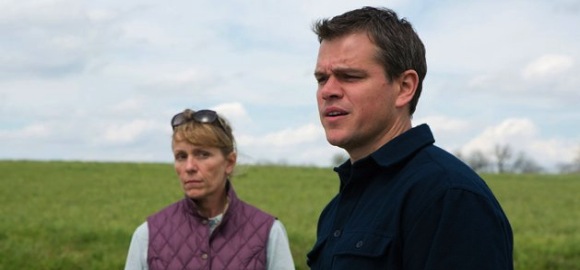Movie Review: Promised Land
Gus Van Sant and Matt Damon re-team for a film that’s as much a character piece as it is a commentary on modern environmentalism and corporatism.
Matt Damon, who co-wrote the script with co-star John Krasinkski, is Steve Butler, a corporate salesman for a company that buys up land in order to access the natural gas below. Along with his associate Sue Thomason (Frances McDormand) they’re latest assignment finds them in a rural Pennsylvania town. It’s also a poor town that’s seemingly on the verge of collapse which, to Sue and Steve, means it should be an easy target. They buy up all the land, promising hefty payment in exchange, and once they’ve bought up the entire town they’ll just move onto the next one. However, just as some of the townsfolk are assembled in the local high school gym to hear Steve’s pitch, which is supposed to just be a formality, the high school science teacher Frank Yates (Hal Holbrook) who insists that the process of obtaining that natural gas, known as fracking, is a lot more complicated than Steve is letting on and opposes their advances. Soon the rest of the town seems to be in opposition to Steve and Sue’s presence as well.
This is the backdrop for the Gus Van Sant’s latest effort Promised Land. To many it would appear that the film revolves around whether fracking is harmless or harmful, however the reason the film succeeds is because it never truly comes down on either side. Sure it errs on the side of negativity, if anything it agrees with Yates’ position that it’s a more complicated issue than Steve and his corporation make it appear, but it’s really about these characters and, how like the struggling townsfolk, they’re just trying to survive. If anything, it’s stance is that of anti-corporation. Steve and Sue expect to just swoop in for a few days and disappear without any roadblocks. But when Yates sets up the first one, another one shows up in the form of grassroots campaigner Dustin Noble (John Krasinski). What Sue and Steve thought would be a swift and easy win turns out to be a bigger fight than they anticipated.
They didn’t expect any blowback, especially that of an organized protester. The film really illuminates how big corporations, like the one that Steve and Sue work for, sugar coat the truth and while Steve and Sue themselves don’t necessarily disagree with Yates’ position, it’s not their job to agree or disagree. They’re there for one reason, to buy up the land and leave with minimal resistance. That’s all they care about. They don’t care about the town or it’s people, they only care about turning a profit. And that’s there Steve begins to falter. He meets another local teacher, Alice (Rosemarie DeWitt), with whom he begins a kinship. For much of the film it’s only an innocent, mutual attraction. They meet in the local bar on his first night and she finds him charming, and vice-versa. But as Steve’s presence becomes more complicated, especially with the arrival of Duncan who appears to also have eyes for Alice, their relationship, if it can even be called that, becomes strained.
For many, the character of Alice will feel superfluous or forced because every film needs a romantic subplot, right? In this case, Alice may be what takes the film from being just another commentary piece and into something more. She embodies and visualizes the internal frustration that Steve is ultimately led to through his battle with Duncan and Yates. At the end of the day Sue and Steve are human. They hear Duncan and Yates loud and clear and, whether they agree with them –which, it should be said, they never clearly do–, isn’t in their job description. As Sue justifies during the hard times “It’s just a job.” But for Steve, it becomes more than that and he only realizes that when he sees Alice’s attitude towards him change. Ultimately, the film is about who Steve is as a man. Does he think fracking is good or bad? It doesn’t matter. What matters is how he presents himself to the world, and that’s where Damon and Krasinski, as writers, and Van Sant really make their statement. For Steve, it’s not necessarily about fracking, it’s about who he represents as an employee and the question becomes does he believe he’s representing a company that’s honest and trustworthy? Because, as a man, that’s who he wants to be.
Rating: 4 out of 5





